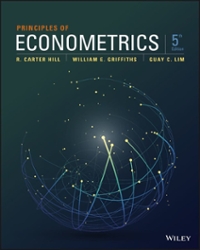In this exercise, we use multinomial logit to describe factors leading an individual to fall into one
Question:
In this exercise, we use multinomial logit to describe factors leading an individual to fall into one of three categories. Use data file \(r w m 88\) for this exercise.
a. Create a variable called INSURED \(=1\), if a person does not have public insurance or add-on insurance \((P U B L I C=0\) and \(A D D O N=0)\). Let INSURED \(=2\) if \((P U B L I C=1\) and \(A D D O N=0)\). Let \(I N S U R E D=3\) if \((P U B L I C=1\) and \(A D D O N=1)\). Tabulate the number of individuals falling into each category. How many individuals are accounted for?
b. Estimate a multinomial logit model with outcome variable INSURED and explanatory variables \(A G E, F E M A L E\), WORKING, and HHNINC2. Use INSURED \(=1\) as the base category. What information is provided by the signs and significance of the estimated coefficients?
c. Obtain the predicted probabilities of falling into each category for each person in the sample, calling them \(P 1, P 2\), and \(P 3\). Find the sample averages of \(P 1, P 2\), and \(P 3\) and compare these to the percentages of the sample for whom INSURED \(=1,2\), and 3 , respectfully.
d. Obtain the predicted probabilities of falling into each category for a person who is 50 years old, female, working and with a household income, \(H H N I N C 2=2400\).
e. Repeat the calculations in (d) for \(H H N I N C 2=4200\).
f. Calculate the 25 th and 75 th percentiles of HHNINC2. Comment on the changes in probabilities computed in parts (d) and (e).
Step by Step Answer:

Principles Of Econometrics
ISBN: 9781118452271
5th Edition
Authors: R Carter Hill, William E Griffiths, Guay C Lim





